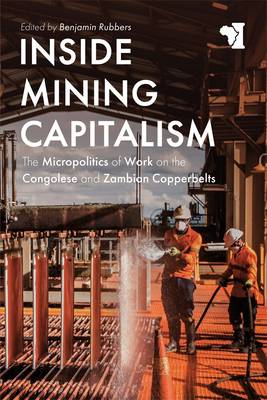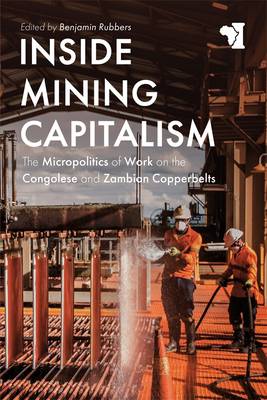
- Afhalen na 1 uur in een winkel met voorraad
- Gratis thuislevering in België vanaf € 30
- Ruim aanbod met 7 miljoen producten
- Afhalen na 1 uur in een winkel met voorraad
- Gratis thuislevering in België vanaf € 30
- Ruim aanbod met 7 miljoen producten
Zoeken
Inside Mining Capitalism
The Micropolitics of Work on the Congolese and Zambian Copperbelts
€ 28,95
+ 57 punten
Omschrijving
A groundbreaking analysis of 21st century labour practices in the mining industry and the new scramble for industrial power on the African continent. Since the beginning of the 21st century, African countries with mineral resources have witnessed an unprecedented rise in foreign direct investments and the development of new flexible workforce management practices in the mining industry. But what does this mean for those who actually work in this industry? Based on research in the Congo and Zambia, where a mining boom has led to more than thirty new mining projects in recent years, this book explores the processes of improvisation and adaptation behind the emergence of this neoliberal labour regime. The contributors show how mining projects' labour practices have been mediated, negotiated, or resisted by mine workers, unionists, and human resource managers. They discuss variations in labour practices put in place by new mining projects depending on the type of capital involved, the type of mine being developed, and their location. Finally, the book examines the implications of power dynamics surrounding companies' labour strategies from the broader perspective of the responsibility of trade unions, gender equality, and identity politics.
Specificaties
Betrokkenen
- Uitgeverij:
Inhoud
- Aantal bladzijden:
- 186
- Taal:
- Engels
- Reeks:
- Reeksnummer:
- nr. 43
Eigenschappen
- Productcode (EAN):
- 9781847012869
- Verschijningsdatum:
- 15/10/2021
- Uitvoering:
- Paperback
- Formaat:
- Trade paperback (VS)
- Afmetingen:
- 140 mm x 216 mm
- Gewicht:
- 217 g

Alleen bij Standaard Boekhandel
+ 57 punten op je klantenkaart van Standaard Boekhandel
Beoordelingen
We publiceren alleen reviews die voldoen aan de voorwaarden voor reviews. Bekijk onze voorwaarden voor reviews.










